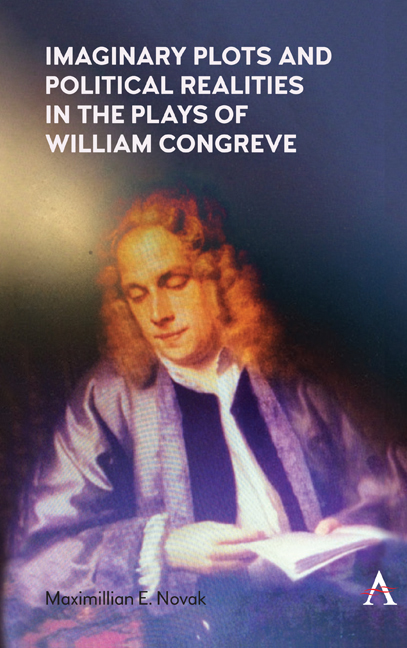Book contents
- Frontmatter
- Contents
- List of Illustrations
- Acknowledgments
- Preface
- 1 The Politics of Love, Marriage, and Scandal in Congreve's World
- 2 Incognita and Some Problems in Morality and Epistemology
- 3 The “Fashionable Cutt of the Town” and William Congreve's The Old Batchelor
- 4 Political and Moral Double Dealing in Congreve's The Double Dealer
- 5 Foresight in the Stars and Scandal in London: Reading the Hieroglyphics in Congreve's Love for Love
- 6 The Failure of Perception and Politics in Congreve's The Mourning Bride
- 7 Politics and Congreve's The Way of the World
- Afterword
- Works Cited
- Index
- Frontmatter
- Contents
- List of Illustrations
- Acknowledgments
- Preface
- 1 The Politics of Love, Marriage, and Scandal in Congreve's World
- 2 Incognita and Some Problems in Morality and Epistemology
- 3 The “Fashionable Cutt of the Town” and William Congreve's The Old Batchelor
- 4 Political and Moral Double Dealing in Congreve's The Double Dealer
- 5 Foresight in the Stars and Scandal in London: Reading the Hieroglyphics in Congreve's Love for Love
- 6 The Failure of Perception and Politics in Congreve's The Mourning Bride
- 7 Politics and Congreve's The Way of the World
- Afterword
- Works Cited
- Index
Summary
In 1988, when the three hundredth anniversary of “The Glorious Revolution” of 1688 was to be celebrated in Great Britain, there was a distinct lack of enthusiasm for the event. Admittedly, a few modest exhibitions were started during this period of the year, but certainly no grand celebration. Edmund Burke had presented this revolution as a mere adjustment in the English political scene— an event entirely different from the French Revolution, even before its frightening executions. There was no parading of a supposedly charming queen such as Marie Antoinette on to the scaffold. No, James II had attempted to leave, had been brought back to London, had hung about for a short time, and then simply left without anyone bothering too much about it. He did attempt several comebacks— in Ireland (he lost the Battle of the Boyne), through a possible invasion— but nothing, it seemed, very effectual. The result was a degree of ambiguity, well encapsulated in the dialogue between Uncle Toby and Corporal Trim in Laurence Sterne's Life and Opinions of Tristram Shandy, published in separate volumes between 1759 and 1767. In presenting a vivid description of the battle of Landen, Uncle Toby waxes enthusiastic over the courage of King William III. Corporal Trim is caught up by Uncle Toby's fervid pronouncement, “Brave,! brave by heaven! […] he deserves a crown,” by shouting, “As richly, as a thief deserves a halter.” Uncle Toby decides that there is no question about Corporal Trim's loyalty and refuses to pursue any objection to this questionable analogy. But as loyal as Corporal Trim might be, we know that he was wounded in his knee at the battle of Landen, left on the battlefield, and suffered excruciating pain in his recovery. For all his loyalty and his love for Uncle Toby, then, there is clearly an unconscious process of association that suggests a degree of ambivalence and resentment toward William III.
And if the history of Congreve's time failed to arouse enthusiasm, its literary history fared even worse. Writing in the middle of the nineteenth century of Congreve and his time, Hippolyte Taine concluded that all their literature was “abortive,” and that they left nothing behind but the memory of corruption. In addition, during the decades preceding the celebration of the Revolution of 1688, there had been something resembling a neo- Jacobite movement. What if Dutch William had not invaded?
- Type
- Chapter
- Information
- Publisher: Anthem PressPrint publication year: 2020



